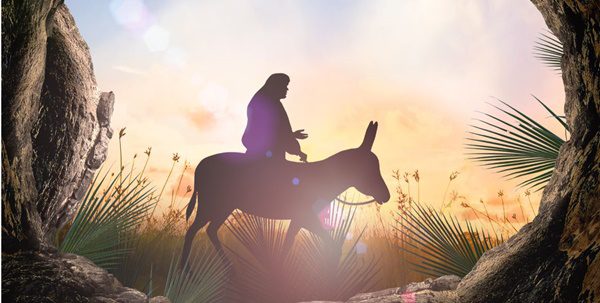My last Sunday Meditation concerned Palm Sunday, and I brought up the issue of the two donkeys in Matthew’s version of the rendering of Christ’s triumphal entrance into Jerusalem. Whether one or two, the donkey is a central element of the Passion story. G. K. Chesterton has an adorable little poem told from the perspective of the donkey.
The Donkey
When fishes flew and forests walked
And figs grew upon thorn,
Some moment when the moon was blood
Then surely I was born.
With monstrous head and sickening cry
And ears like errant wings,
The devil’s walking parody
On all four-footed things.
The tattered outlaw of the earth,
Of ancient crooked will;
Starve, scourge, deride me: I am dumb,
I keep my secret still.
Fools! For I also had my hour;
One far fierce hour and sweet:
There was a shout about my ears,
And palms before my feet.
There isn’t too much to analyze. There is some lovely alliteration in the first stanza with the “f” consonants, which is picked up later with “four-footed” in the second stanza, and “fools” and “far fierce” in the last stanza. The other alliterative sound is the “s” consonant which is sprinkled in each of the stanzas, but most important to the third stanza. Each stanza’s second and fourth lines end in full rhyme, but the first and third have a have a slant or distant rhyme.
The donkey speaks of being born—or is he referring to the origination of the donkey species?—in a strange, malevolent time. This is linked to the oddity of his being, and, while not being evil himself, he is a “parody” of the devil in appearance. With this he has had to live an oppressed and afflicted life. He too is a suffering servant, regularly going through his own passion stations. But he is redeemed on his “hour,” on Palm Sunday by carrying the triumphal Son of David.
One last element to notice. Chesterton mostly keeps the meter in every line except for the most key line in the whole poem, the third line of the third stanza: “Starve, scourge, deride me: I am dumb.” This is a clear allusion to Christ with the donkey considering himself the analogue to Christ, a Christ-figure! The donkey is saying, that, while I may be your whipping beast, I had the dignity of carrying the Christ.
Here
is a lovely reading of the poem.
And
here is one of my favorite hymns appropriate for the triumphal entry.
How
beautifully sung. Have a blessed Easter Triduum.


Beautiful!
ReplyDelete